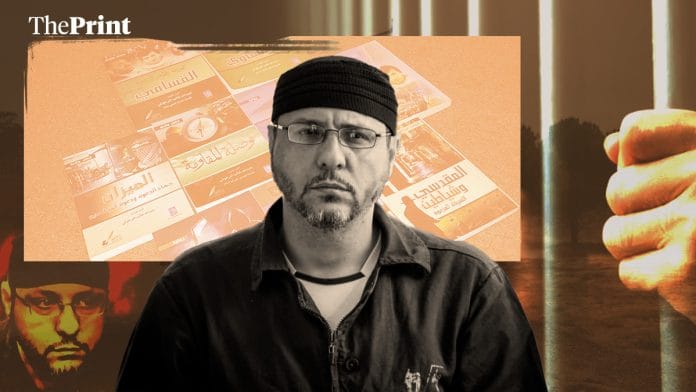New Delhi: Abdullah Ghaleb Barghouti, popularly known as Hamas’s ‘engineer’ and considered one of the most notorious prisoners in Israel, is at the top of the militant outfit’s list for a prisoner swap.
In a meeting in Qatar Monday, Hamas maintained that any peace deal must include a serious exchange deal between hostages in Gaza and Palestinians held in Israeli jails, apart from a complete Israeli withdrawal from Gaza. Meanwhile, the United Nations has unanimously passed a US-backed resolution endorsing a three-phase ceasefire plan.
Barghouti, held responsible for the death of over 60 Israelis and five Americans, is currently serving the longest sentence meted out to a Palestinian in the history of the Israeli criminal justice system. The bomb maker was sentenced to 5,200 years in jail or 67 consecutive life terms by an Israeli military court in 2004.
The former commander of the Izz al-Din al-Qassam Brigades — Hamas’s armed wing — Barghouti was born in Kuwait, where he fought against American forces, according to All 4 Palestine, a platform which documents the stories of prominent Palestinian figures.
While his roots lie in the West Bank, his family resides in Jordan. He was one of the prisoners expected to be sent to Jordan to complete the rest of his sentence in December 2022, as offered by Israel. He has been a part of the conversation in various prisoner swap proposals and release deals, notably in 2011 and 2023, but his release has been nowhere in sight so far.
It was the First Intifada, a series of protests and riots between 1987 and 1993 sparked by the killing of four Palestinians in a crash by an Israeli vehicle in Gaza, that led to his allegiance shifting to his “homeland” as he narrates his memoir, Prince of the Shadow: Engineer on the Road, which he wrote in prison. He writes that he was deeply moved after his uncle and cousin were killed in the resistance movement against Israeli occupation.
Barghouti travelled to Palestinian territories in 1999 and joined Hamas as an ‘engineer’.
‘Revenge attacks’
In an interview with CBS News from within the confines of the prison in 2006, Barghouti had said that he, “a university graduate, well-travelled and a music lover”, had made his first suicide bomb with his guitar — a “prized possession”.
“I got my best piece, the guitar. I have it, I like it, I respect it. I open it, make a bomb inside it, close it, send it with the guy. And he makes the bomb. And it’s done,” Barghouti had told CBS News.
He was “driven by revenge” after the killing of two Hamas leaders in a helicopter crash. The two commanders killed in July 2001 — Mahmoud Abu Hanoud and Ayman Halawa — were supposedly his “best friends”.
Barghouti then planned a series of revenge attacks and began training Palestinian youths in making explosive devices, using hand grenades, and so on. He began organising the trainees into cells to target the Israeli forces in Jerusalem.
Over a period of two years (between 2001, when he decided to avenge his friends, to 2003, when he was arrested), he sent bombs to the most ordinary of public places and is said to have killed several Americans and more Israelis than anyone else, including children and pregnant women.
These attacks instilled fear among people and attracted international attention. In the 2002 bombing of the Hebrew University of Jerusalem, seven people were killed and over 80 wounded. The then United Nations Secretary-General Kofi Annan had condemned the attack and had called on the parties to “return to the path of negotiations on a permanent settlement”.
Apart from the bombing at the Hebrew University, Barghouti was convicted of making bombs that claimed lives in the suicide bombings at Cafe Moment, right across the street from the Israeli prime minister’s office, killing 12 people and wounding over 50 in 2002, and one in 2001 at a Sbarro pizzeria outlet in the centre of west Jerusalem, which killed 15 and wounded 150 others.
He was also convicted in a multiple bombing incident at Jerusalem’s Ben Yehuda pedestrian mall, killing 11 and injuring 188 others. Explosions took place at the mall and in a car nearby within 20 minutes of each other.
Also Read: Muizzu in Delhi, Maldives parliamentary panel opens inquiry into previous govt’s pacts with India
Barghouti’s arrest
Barghouti was arrested in March 2003 — after a brief manhunt by the Israeli forces — while he was taking his daughter to be treated at a Palestinian hospital in the West Bank city of Al-Bireh, according to the Middle East Monitor.
During his trial in the Israeli military court, he pleaded guilty to building the bombs that killed 66 people and wounded more than 500. In the absence of a death penalty in Israel, the court had ordered one life sentence per killing and another for wounding 500 people, making the sentence meted out to Barghouti the longest ever. He was 32 at that time.
“If my organisation, she say ‘you should do it’, I will do it, and I will close my eyes (sic),” Barghouti had told CBS News, implying that he was ready to make bombs again if he ever managed to escape. “Who try to destroy you, you should destroy him (sic),” he had added.
He has been held at the Be’er Sheva Prison and reports have indicated multiple solitary confinements since. In 2015, he smuggled a phone into the prison and gave an interview to Hamas radio. After this, he was placed in an isolation cell.
Barghouti was allowed to meet his family in 2022, about 20 years after his arrest. The visit lasted 45 minutes, and the family members were allowed to speak with him through a glass barrier and an intercom device.
(Edited by Mannat Chugh)
Also Read: Indian Ocean has suddenly become ‘Indo-Pacific’ due to geopolitics, says Sri Lanka President






